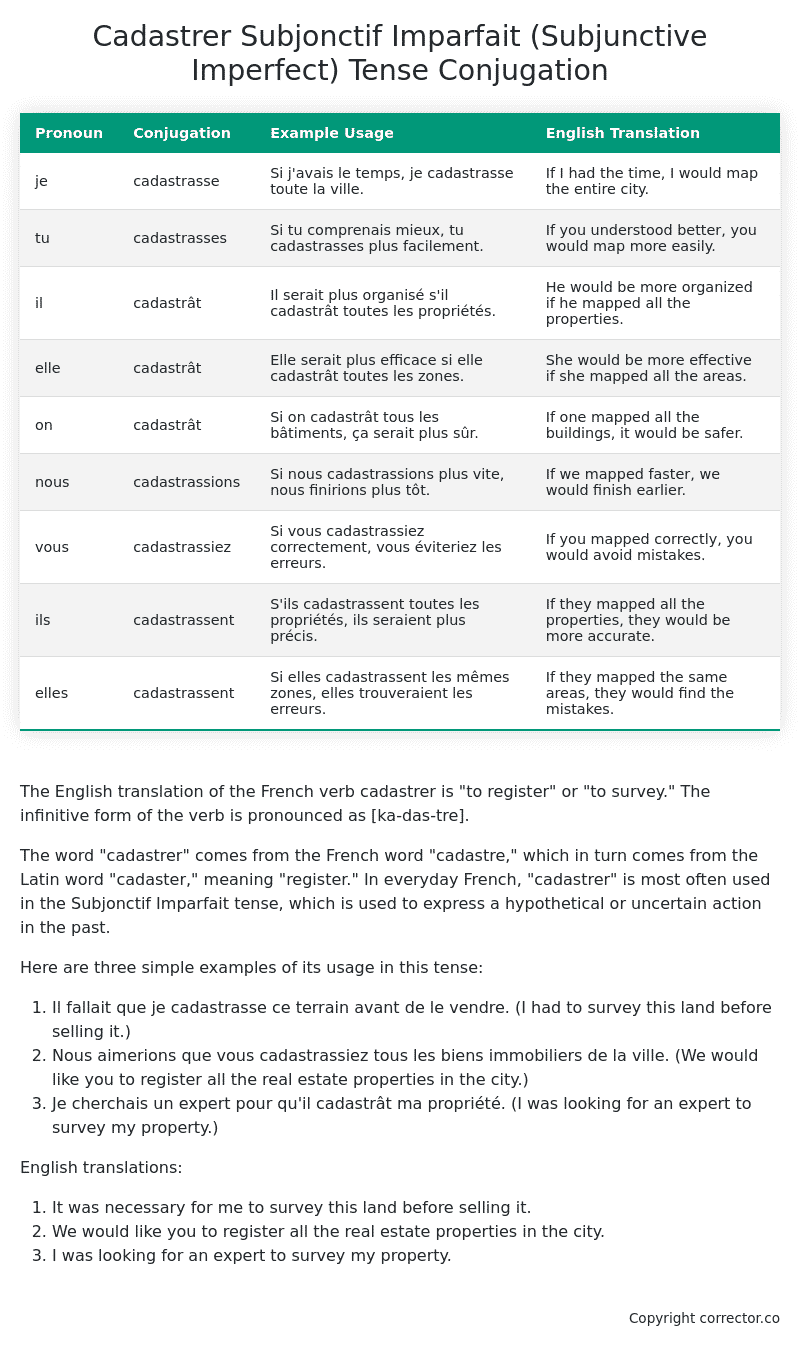Subjonctif Imparfait (Subjunctive Imperfect) Tense Conjugation of the French Verb cadastrer
Introduction to the verb cadastrer
The English translation of the French verb cadastrer is “to register” or “to survey.” The infinitive form of the verb is pronounced as [ka-das-tre].
The word “cadastrer” comes from the French word “cadastre,” which in turn comes from the Latin word “cadaster,” meaning “register.” In everyday French, “cadastrer” is most often used in the Subjonctif Imparfait tense, which is used to express a hypothetical or uncertain action in the past.
Here are three simple examples of its usage in this tense:
- Il fallait que je cadastrasse ce terrain avant de le vendre. (I had to survey this land before selling it.)
- Nous aimerions que vous cadastrassiez tous les biens immobiliers de la ville. (We would like you to register all the real estate properties in the city.)
- Je cherchais un expert pour qu’il cadastrât ma propriété. (I was looking for an expert to survey my property.)
English translations:
- It was necessary for me to survey this land before selling it.
- We would like you to register all the real estate properties in the city.
- I was looking for an expert to survey my property.
Table of the Subjonctif Imparfait (Subjunctive Imperfect) Tense Conjugation of cadastrer
| Pronoun | Conjugation | Example Usage | English Translation |
|---|---|---|---|
| je | cadastrasse | Si j’avais le temps, je cadastrasse toute la ville. | If I had the time, I would map the entire city. |
| tu | cadastrasses | Si tu comprenais mieux, tu cadastrasses plus facilement. | If you understood better, you would map more easily. |
| il | cadastrât | Il serait plus organisé s’il cadastrât toutes les propriétés. | He would be more organized if he mapped all the properties. |
| elle | cadastrât | Elle serait plus efficace si elle cadastrât toutes les zones. | She would be more effective if she mapped all the areas. |
| on | cadastrât | Si on cadastrât tous les bâtiments, ça serait plus sûr. | If one mapped all the buildings, it would be safer. |
| nous | cadastrassions | Si nous cadastrassions plus vite, nous finirions plus tôt. | If we mapped faster, we would finish earlier. |
| vous | cadastrassiez | Si vous cadastrassiez correctement, vous éviteriez les erreurs. | If you mapped correctly, you would avoid mistakes. |
| ils | cadastrassent | S’ils cadastrassent toutes les propriétés, ils seraient plus précis. | If they mapped all the properties, they would be more accurate. |
| elles | cadastrassent | Si elles cadastrassent les mêmes zones, elles trouveraient les erreurs. | If they mapped the same areas, they would find the mistakes. |
Other Conjugations for Cadastrer.
Le Present (Present Tense) Conjugation of the French Verb cadastrer
Imparfait (Imperfect) Tense Conjugation of the French Verb cadastrer
Passé Simple (Simple Past) Tense Conjugation of the French Verb cadastrer
Passé Composé (Present Perfect) Tense Conjugation of the French Verb cadastrer
Futur Simple (Simple Future) Tense Conjugation of the French Verb cadastrer
Futur Proche (Near Future) Tense Conjugation of the French Verb cadastrer
Plus-que-parfait (Pluperfect) Tense Conjugation of the French Verb cadastrer
Passé Antérieur (Past Anterior) Tense Conjugation of the French Verb cadastrer
Futur Antérieur (Future Anterior) Tense Conjugation of the French Verb cadastrer
Subjonctif Présent (Subjunctive Present) Tense Conjugation of the French Verb cadastrer
Subjonctif Passé (Subjunctive Past) Tense Conjugation of the French Verb cadastrer
Subjonctif Imparfait (Subjunctive Imperfect) Tense Conjugation of the French Verb cadastrer (this article)
Subjonctif Plus-que-parfait (Subjunctive Pluperfect) Tense Conjugation of the French Verb cadastrer
Conditionnel Présent (Conditional Present) Tense Conjugation of the French Verb cadastrer
Conditionnel Passé (Conditional Past) Tense Conjugation of the French Verb cadastrer
L’impératif Présent (Imperative Present) Tense Conjugation of the French Verb cadastrer
L’infinitif Présent (Infinitive Present) Tense Conjugation of the French Verb cadastrer
Struggling with French verbs or the language in general? Why not use our free French Grammar Checker – no registration required!
Get a FREE Download Study Sheet of this Conjugation 🔥
Simply right click the image below, click “save image” and get your free reference for the cadastrer Subjonctif Imparfait tense conjugation!

Cadastrer – About the French Subjonctif Imparfait (Subjunctive Imperfect) Tense
Formation
Common Everyday Usage Patterns
Interactions with Other Tenses
Subjonctif Présent
Indicatif Passé Composé
Conditional
Conditional Perfect
Summary
I hope you enjoyed this article on the verb cadastrer. Still in a learning mood? Check out another TOTALLY random French verb conjugation!


